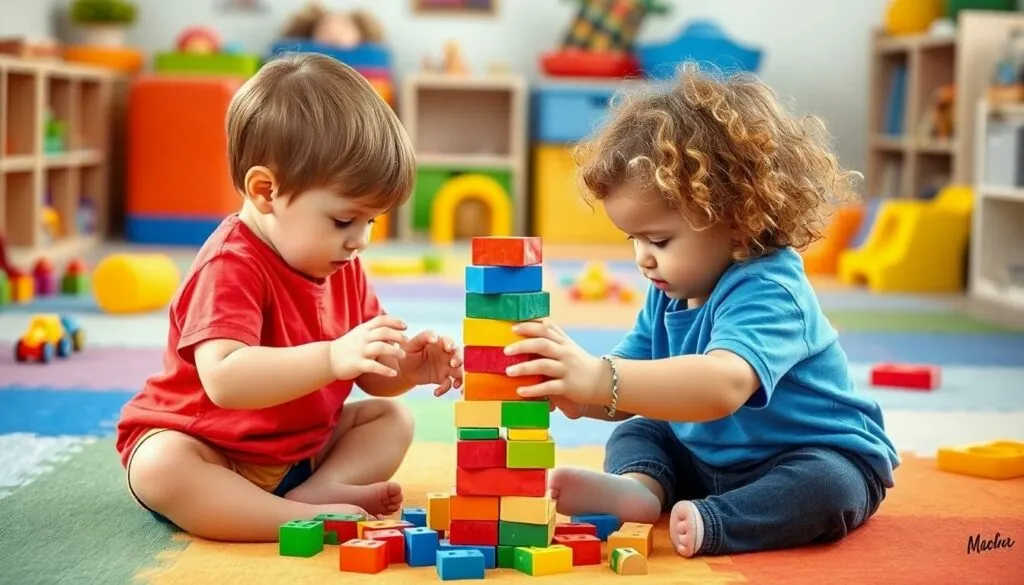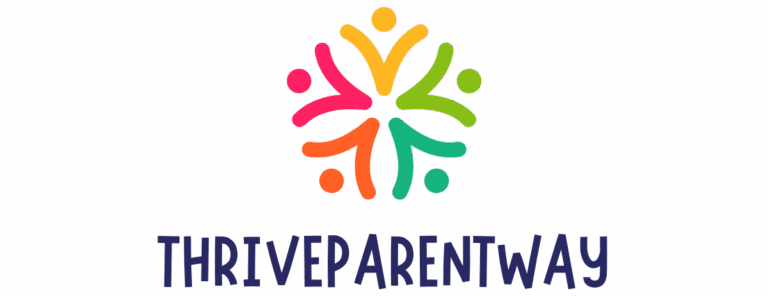In a world where kids rule the playground and snack time is a serious business, careers in child development offer a unique blend of fun and fulfillment. Imagine spending your days guiding the next generation while dodging flying toys and deciphering the latest trends in toddler speak. Who wouldn’t want to be a superhero in the eyes of a child?
From nurturing their creativity to shaping their social skills, professionals in this field play a pivotal role. Whether it’s designing engaging learning environments or advocating for children’s rights, the opportunities are as diverse as a child’s imagination. So if you’re ready to turn your passion for kids into a rewarding career, buckle up! Here are ten exciting paths that not only promise to keep you on your toes but also make a lasting impact on young lives.
Table of Contents
ToggleOverview Of Child Development Careers
Child development careers encompass a wide range of professions focused on nurturing children’s growth and development. Many roles in this field involve working directly with children, families, and communities to enhance learning and well-being. Employment opportunities exist in education, healthcare, social services, and research.
Professionals often pursue careers as early childhood educators, guiding young learners in foundational skills. Child psychologists provide emotional and behavioral support, while child life specialists assist children in healthcare settings, addressing their psychological needs. Social workers play a crucial role in connecting families to resources, advocating for children’s rights and welfare.
Speech-language pathologists help children develop communication skills. Occupational therapists focus on improving children’s abilities to perform daily activities, and developmental specialists assess children’s milestones and offer tailored interventions. Additionally, researchers in child development study various aspects of growth to inform best practices.
Job responsibilities vary across these careers, yet all share a commitment to positively impacting children’s lives. Collaboration among professionals enhances outcomes through shared resources and knowledge. The demand for skilled individuals in child development remains robust, reflecting society’s dedication to fostering healthy child development.
Careers in child development provide diverse paths for individuals passionate about making a difference. By exploring these roles, one can discover opportunities that align with personal strengths and interests, fueling a rewarding professional journey in helping children thrive.
Career 1: Child Psychologist

Child psychologists play a crucial role in understanding and addressing children’s mental and emotional needs. They provide invaluable support to children facing various challenges, promoting their overall well-being.
Responsibilities
Child psychologists assess developmental progress through observations and evaluations. Therapy sessions follow, during which they use techniques like play therapy and cognitive-behavioral methods. They create individual treatment plans tailored to each child’s specific needs. Collaboration with parents and educators establishes a support network for the child. Data collection provides insight into behavior, helping track progress. They also conduct research that furthers understanding of child mental health, contributing to the broader field.
Required Qualifications
A doctoral degree in psychology, specifically in child psychology, is essential for this career. Licensing requirements vary by state, often necessitating supervised clinical experience. Coursework in child development, behavioral psychology, and assessment methods forms a solid foundation. Certification from organizations like the American Board of Professional Psychology enhances credibility. Strong communication skills facilitate effective interactions with children and families. Lifelong learning through continuing education ensures professionals remain updated on best practices and emerging research.
Career 2: Early Childhood Educator
Early childhood educators play a vital role in shaping young minds. They create supportive environments where children can explore, learn, and grow.
Responsibilities
Early childhood educators develop and implement age-appropriate curricula. They promote social, emotional, and cognitive development through play-based learning. Assessing children’s progress regularly forms a crucial part of their role. Communicating with parents about their child’s growth ensures collaboration and support. They foster creativity by incorporating various teaching methods and activities. Maintaining a safe and inclusive classroom environment remains essential for optimal learning. Organizing events and activities that engage families strengthens community ties.
Required Qualifications
A bachelor’s degree in early childhood education or a related field typically represents the minimum requirement. Many states require early childhood educators to obtain specific certifications or licenses. Gaining hands-on experience through student teaching or internships enhances employability. Understanding child development theories proves beneficial for effective instruction. Strong communication skills help foster relationships with children, parents, and colleagues. Continuous professional development remains important for staying current with best practices and educational trends.
Career 3: Child Life Specialist
Child life specialists play an essential role in supporting children and their families facing challenging healthcare experiences. They focus on helping children understand complex medical procedures, cope with hospital stays, and maintain a sense of normalcy during treatment.
Responsibilities
Child life specialists design and implement therapeutic programs to ease anxiety. They utilize play and creative interventions to help children express feelings about their experiences. Providing education about medical conditions and treatments forms a core part of their duties. They work collaboratively with medical staff to ensure developmentally appropriate care. Supporting family members during difficult times is vital, offering resources to help them navigate emotional challenges. Specialists also assess children’s behavior, making timely adjustments to strategies that enhance comfort and engagement. Regularly documenting each child’s progress helps develop individualized care plans.
Required Qualifications
A minimum of a bachelor’s degree in child development, psychology, or a related field is typically necessary. Many employers prefer candidates with specialized training in child life principles. Completing a child life internship is crucial for gaining hands-on experience in a medical setting. Certification through the Association of Child Life Professionals may also be required, emphasizing the importance of professional standards. Strong communication skills play a vital role in effectively interacting with children, families, and healthcare teams. Additionally, emotional resilience and empathy are critical for supporting children during vulnerable moments in their lives. Continuing education will enhance knowledge of best practices in child life and contribute to career advancement.
Career 4: Pediatric Occupational Therapist
Pediatric occupational therapists focus on enhancing children’s ability to perform daily activities. They play a crucial role in supporting motor skills and promoting independence.
Responsibilities
Therapists assess children’s developmental challenges and design tailored intervention plans. They help improve fine motor skills through engaging activities like crafts or games. Collaboration with families encourages therapeutic activities at home. Building adaptive techniques aids children in navigating daily tasks, such as dressing or feeding. Regular progress monitoring ensures interventions remain effective and appropriate. Occupational therapists may also educate parents and caregivers on strategies to support their child’s development, fostering a holistic approach to care.
Required Qualifications
A master’s degree in occupational therapy is essential for this role. Licensure is mandated, requiring passing the National Board for Certification in Occupational Therapy exam. Practical experience through fieldwork or clinical internships is highly valued. Continuous education keeps therapists informed about best practices and emerging techniques. Strong communication skills enhance interactions with children and families, promoting a supportive environment. Additional certifications in pediatric therapy or specialized programs can provide competitive advantages in this field.
Career 5: Speech-Language Pathologist
Speech-language pathologists work to assess, diagnose, and treat communication and swallowing disorders in children. Their contributions significantly enhance children’s ability to communicate effectively and develop social skills.
Responsibilities
Assessing children’s speech and language abilities constitutes a primary responsibility. Developing individualized treatment plans follows, focusing on specific communication challenges. Therapists often conduct therapy sessions using fun activities and evidence-based techniques. Collaborating with families ensures that interventions continue at home. Monitoring progress through regular evaluations helps adapt strategies to meet each child’s evolving needs. Educating families about communication disorders strengthens overall support.
Required Qualifications
A master’s degree in speech-language pathology is essential for this career. State-specific licensure allows practice in various settings, such as schools or clinics. Completing a supervised clinical fellowship provides practical experience necessary for competency. Certification by the American Speech-Language-Hearing Association may enhance credibility and job prospects. Strong communication skills and patience are vital traits for success in interactions with children and their families. Continuous professional development keeps therapists updated on new methods and research in the field.
Career 6: Child Social Worker
Child social workers play a vital role in advocating for children’s welfare and well-being. They address various issues, including abuse, neglect, and emotional difficulties, ensuring a safe and supportive environment for children.
Responsibilities
Responsibilities of child social workers include assessing children’s needs, conducting interviews with families, and developing actionable plans. They provide counseling to children experiencing trauma and work closely with schools and healthcare providers to coordinate support. Crisis intervention is another critical aspect of their role; they often step in during emergencies to safeguard children’s safety. Additionally, they help families access necessary resources, such as mental health services and educational support, promoting overall child development.
Required Qualifications
To become a child social worker, a bachelor’s degree in social work or a related field is required. Many seek a master’s degree for advanced positions, coupled with state licensure. Practical experience through internships or volunteer work enhances their skills. Strong interpersonal skills and the ability to communicate effectively are crucial for fostering relationships with children and families. Continued education keeps professionals updated on best practices and legal requirements in child welfare.
Career 7: Special Education Teacher
Special education teachers work with students who have diverse learning needs. They create tailored educational strategies that address individual challenges effectively.
Responsibilities
Designing lesson plans that accommodate various abilities stands as a core responsibility. Implementing engaging teaching methods enriches learning experiences for students with disabilities. Assessing student progress and adapting programs ensures continuous improvement. Collaborating with parents and specialists fosters a supportive environment. Managing classroom behavior through positive reinforcement maintains a productive learning space.
Required Qualifications
A bachelor’s degree in special education or a related field generally serves as the foundation for this career. State-specific teaching licenses are essential for employment in public schools. Familiarity with special education laws and best practices enhances effectiveness in the classroom. Continued education often occurs through workshops and professional development courses. All teachers benefit from strong communication skills to effectively engage with students, families, and colleagues.
Career 8: Developmental Researcher
Developmental researchers study child growth, focusing on cognitive, social, and emotional development. They contribute valuable insights that inform educational practices, policies, and interventions for children.
Responsibilities
Responsibilities include designing and conducting studies that examine developmental milestones. They collect and analyze data, applying statistical methods to interpret findings. Collaborating with educators and clinicians enhances the relevance of research outcomes. Researchers often present their work at conferences, sharing knowledge with the broader community. Writing reports and articles for publication ensures that findings reach those who can implement changes. Engaging with parents and children provides essential perspectives that inform research initiatives.
Required Qualifications
Required qualifications typically include a doctoral degree in developmental psychology or related fields. Many positions call for extensive research experience, often gained through postdoctoral fellowships. Strong analytical skills are crucial for managing complex data sets and deriving meaningful conclusions. Familiarity with ethical research practices is necessary, as researchers often work with vulnerable populations. Effective communication abilities are important for presenting research to diverse audiences. Continuous education is essential to remain informed about evolving theories and methodologies in child development research.
Career 9: Youth Counselor
Youth counselors provide crucial support to adolescents facing emotional, social, or behavioral challenges. They encourage personal growth and foster resilience through tailored guidance.
Responsibilities
Youth counselors create a safe environment for young people to express thoughts and feelings. They conduct assessments to identify emotional and behavioral needs. Developing individualized treatment plans helps address specific challenges. Counselors facilitate group or individual counseling sessions to promote social skills and conflict resolution. Collaborating with families ensures holistic support for the youth. Tracking progress and adapting strategies to meet evolving needs is essential for effectiveness.
Required Qualifications
Candidates typically require a bachelor’s degree in psychology, social work, or a related field. Many pursue a master’s degree for advanced roles or specialized knowledge. State licensure is often necessary; certification may be available through professional organizations. Strong interpersonal skills are critical for building trusting relationships with youth. Experience through internships or volunteer work enhances practical knowledge and skills. Continuous education keeps counselors updated on best practices and innovative approaches in youth guidance.
Career 10: Family Support Worker
Family support workers play a crucial role in assisting families to enhance their children’s emotional and social well-being. They provide guidance, resources, and advocacy for families, helping them overcome challenges and improve their overall stability.
Responsibilities
Family support workers conduct assessments to identify family needs and strengths. They develop individualized service plans in collaboration with families, connecting them to community resources such as healthcare, education, and counseling services. Maintaining regular contact with families is essential, allowing for ongoing support and monitoring of progress. Facilitating parent education workshops to promote healthy family dynamics also forms part of their responsibilities. It’s vital these professionals possess strong communication skills for effective interaction with families and community partners.
Required Qualifications
A bachelor’s degree in social work, child development, or a related field typically serves as the minimum educational requirement for family support workers. Many employers prefer candidates with a master’s degree for advanced roles, especially in complex situations. Completing internships in social services or child welfare provides practical experience. Licensure may be necessary depending on the state or organization, alongside training certifications in areas like family dynamics and crisis intervention. Emotional resilience and effective problem-solving skills are essential attributes for success in this career.
The field of child development offers a wealth of fulfilling career opportunities. Each role plays a crucial part in nurturing children’s growth and well-being. From educators to therapists and social workers, these professionals contribute significantly to shaping young lives.
As society continues to prioritize children’s needs, the demand for skilled individuals in this area will only increase. Those passionate about making a difference can find a career path that aligns with their strengths and interests. Whether through direct interaction with children or support for families, the impact of these careers is profound and lasting. Exploring these paths can lead to a rewarding journey in child development.








